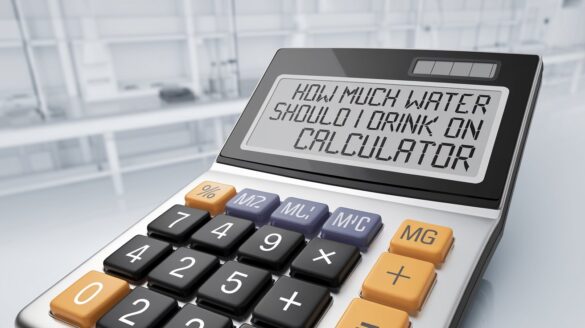Hydration plays a crucial role during the use of creatine in a fitness program to achieve efficiency and safety.
Creatine monohydrate works through hydrated water entering the muscle cells to enhance performance and facilitate recovery; thus, there would be an increased need for one to take water.
This article explains the science behind creatine-related hydration needs, how much water is recommended, and the application of a specialized water intake calculator to enhance hydration levels.
Why Hydration Matters When Taking Creatine
Creatine’s Effect on Muscle Cells and Fluid Retention
The most fundamental function that creatine serves is helping muscle cells generate energy for exercise. After creatine enters the muscle cell, it retains water and causes the cell to swell, which supports endurance and recovery. The fluid retention in cells that comes when taking creatine serves as a reminder to stay hydrated so as not to incur dehydration and thereby make sure muscle function is maintained
Creatine Abuse Risks of Dehydration
Using creatine without hydration raises your chances for getting the symptoms of dehydration, such as muscle cramp, headaches, or fatigue. Low water consumption may also reduce the outcomes of creatine supplementation in terms of possible performance boosts and recovery. Proper hydration reduces the risk and will ensure that the supplement does its job.
How Much Water Should I Drink When Taking Creatine?
General Water Intake Guidelines
General principles suggest that individuals taking creatine should consume at least 8 to 10 additional glasses of water daily.
If the dose is higher and one is on a cycle of loading, then most likely more will be required.
Yet for maintenance, lesser amounts of creatine are supplemented, and the water consumed would be less, yet sufficient to keep one hydrated.
Factors Affecting Fluid Intake
Water during creatine intake differs from one individual to the other and also depends on different environmental conditions, which include:
Body Weight and Mass
Commonly, the greater the weight and the more significant the mass of muscles in the body, the greater the amount of water required for hydration and proper absorption of creatine.
Level of Physical Activity
The more active physically, the more sweating occurs and leads to a greater fluid loss, thus requiring more hydration to enable exercise to be continued over longer periods without muscle weakening.
Environment Condition
Heat and humidity increase fluid loss, hence the use of hydrating fluids is maximized.
How the Calculator Works
A creatine water intake calculator is a resource that outlines optimal hydration levels based on some critical personal variables.
Possible input factors might include weight, activity level, and daily creatine dosage.
Based on these factors, it allows a person to have a better target hydration, considering their unique needs for optimizing their hydration.
Benefits of Using a Calculator
The calculator presents many benefits such as:
Personalized Recommendations: Indicates a personalized hydration rate to the body of the user and rate of consumption of creatine for improved efficiency in rehydration
Protection against overhydration or dehydration: It ensures that the rate is kept at the perfect amounts so as to avoid dehydration and overhydration risks.
Best Hydration Safety Measures When on Creatine
How to Hydrate
Through these simple measures, individuals can have control over hydration processes but can consume creatine.
Hydration Reminders: Making time and reminding one’s self to drink water throughout the day will maintain steady hydration, thus making it easier to hydrate.
Intake of Hydrating Foods: Consuming foods with a high content of water
for example watermelon, cucumbers, and oranges, complements fluid intake while maintaining hydration levels.
Monitoring Hydration Levels
hydration needs to be monitored in order not to get too imbalanced. Here are some key signs to look for when checking your hydration levels:
Color of Urine: Yellowish urine normally will show that one is hydrated, but darker shades may mean not enough hydration.
Thirst Levels: Persistent thirst is an indication of under-hydration, usually during exercise or creatine supplementation.
FAQs
How much water shall I drink daily while on creatine?
For most people, 8-10 glasses of water a day would suffice when supplementing with creatine, although actual requirements are different.
Dehydration
Do I risk losing benefits from creatine due to dehydration?
Yes. When improperly hydrated, the effectiveness of creatine decreases, making the muscle perform poorly and increases susceptibility to muscle cramps.
Should I drink more water in the creatine loading phase?
Excessive fluid intake during the loading phase is often recommended because creatine supplementation can improve osmotic water retention in muscles.
Is there a risk to drink too much water when consuming creatine?
Overhydration is a condition that’s considered harmful, and better judgment would simply be to aim for levels within the norm rather than over it. A water calculator would better tell you that.
Does creatine retention increase the amount of water retained in the body?
Yes, creatine attracts water into the muscle cells, and thus, cell volumization is created, a principle that requires increased hydration.
Conclusion
Hydration plays an important role when supplementing with creatine. Personalized water intake enhances the supplementation process, supports muscle function, and benefits overall physical performance. Taking best practices and also using a water intake calculator will help in creating the right hydration balance that supports both the effectiveness of creatine and optimal physical performance.

